When it comes to really utilising all the power your solar energy system can produce for you, you’re going to need a battery.
Storing the energy produced during the day means you can use it in the evenings and nights when, traditionally, the price of a kWh can be much higher if bought from an energy supplier.
Adding a battery to your system is not just a case of ‘plug in and save’ – some batteries are only compatible with certain systems, some will not hold enough power and some will just be, well, rubbish.
We’ve asked around the office and the techies have recommended us 10 great solar batteries that will help you save money for years to come.
Why do I need battery storage?
Because you will save WAY more money!
Your panels produce electricity whenever the daylight is hitting them, sometimes lots and sometimes a little.
If you are not storing that electricity during the day then it’s either being exported to the grid or being wasted.
Savvy electricity suppliers are now offering flexible tariffs so you can send energy to the grid when they need it most – which is usually the best time for you to send it.
You can only do this with battery storage.
Plus, you can charge your batteries from the grid during the night, when you will get a reduced rate on each kWh… if you find a tariff that allows that.
Capacity
The capacity of a battery is measured in kilowatt hours, or kWh, much the same as the units on the electricity bill.
It refers to the amount of power a battery can store – and discharge.
The way batteries work is by storing electrical energy as chemical energy within a very delicately balanced collection of materials, including electrolytes and negatively charged semiconductors along with their positive counterparts.
Power comes from the inverter, and is absorbed by the battery as ‘potential energy’ and, when an appliance draws current from the battery, a reaction creates the electricity again and the appliance bursts into life.
The amount of material inside the batteries, and the mixing of materials, gives you the capacity.
The capacity written on the side of the battery is NOT always the capacity you get as discharging a battery to 0% can create a short circuit and cause damage.
Solar battery storage costs
When it comes to the cost of a solar battery, or a stack of solar batteries, the price will be dependent on the amount of storage you want.
A simple rule of thumb is: the more storage you have, the more expensive your battery, or batteries, will be.
Problem is, we can’t say 1kwh of storage with cost you ‘X’ amount of pounds.
Take for instance the Tesla Powerwall 3, which is currently able to store 13.5 kWh of usable energy, is around £7,500 as of July 2024.
While a Enphase AC Battery that stores 1.2kWh retails for around £2,500.
With the Tesla there will be a few quid added on for the name, but you can see how storage and price works.
Depth of Discharge
This metric alludes to the previous one as it is the amount of power you can draw from the battery before the battery management systems stop you.
Most batteries come with a depth of charge of around 94 – 96% but some modern batteries will allow a 100%.
If they can discharge to 100% it means the battery management is doing its work and the battery will start charging again as soon as it hits that 100%, which will draw power from the system… which is a bit of a waste.
Operating Temperature
Heat is a particularly important factor in the efficiency and longevity of a battery, with higher temperatures causing problems for the chemicals inside.
Different types of batteries can stand various kinds of extreme temperatures but, here in the UK, most batteries installed in solar systems are Lithium Ion.
Lithium Ion batteries can function between minus 20 and plus 60 Celsius but they are best kept at plus 10 to plus 30 Celsius.
So, as the UK has fairly temperate weather, your battery will be functioning well all year.
Lifespan of a Solar Battery
The lifespan of a battery is measured in how many cycles of charging and discharging it can handle before it starts to lose its ability to retain a charge.
For a standard Lithium-Ion battery, the charge cycles can be between 4000 and 6000 which, at 1 cycle a day, would be a lifespan of 10 – 15 years.
During the winter, your battery may charge and discharge twice a day.
So, what’s on the market?
TLDR.
[table id=17 /]Tesla Powerwall 3 – £7, 450 (Average)
The Powerwall 3 is the second-generation hybrid battery from Tesla.
It has an immense amount of storage at 13.5 kWh, which is more than enough to run an average household for a day.
The system has all that storage, a built-in inverter and something called the Backup Gateway. This Gateway communicates with the Tesla app to tell you all about your energy usage.
You can stack power walls together for more storage but it may be a bit overkill.
Powerwalls will charge from either a PV array or from the grid – the app will control this.
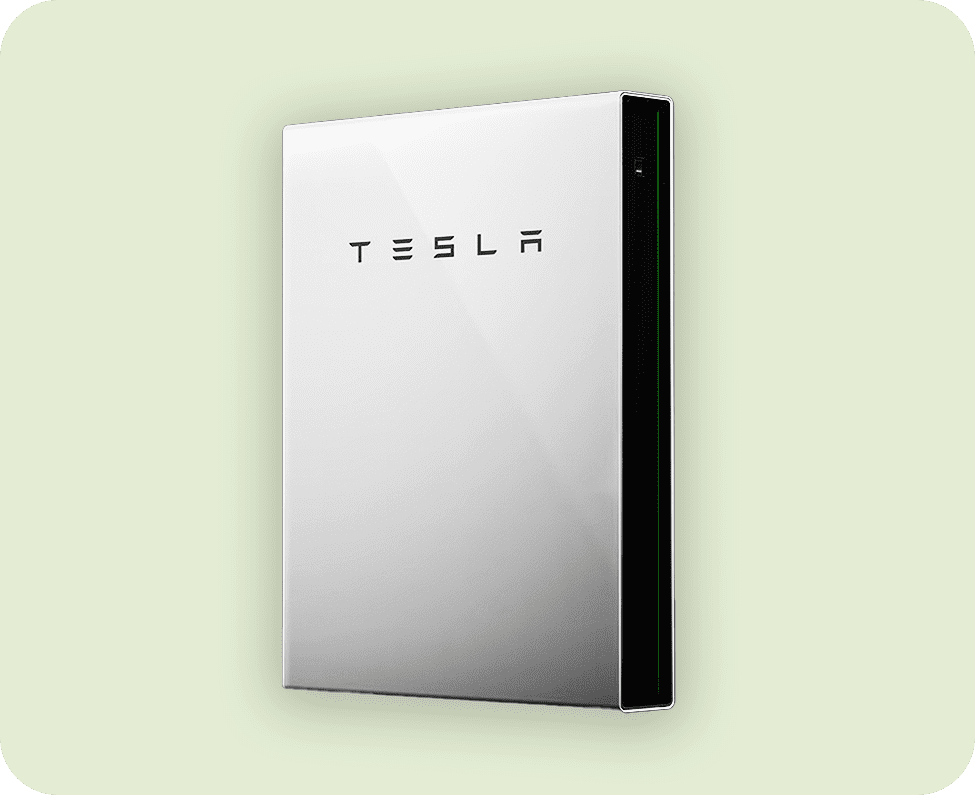
| Specification | Value |
| Dimensions | Height 1,150mm x Width 753 x Depth 147mm |
| Weight | 114kg |
| Depth of discharge | 100% |
| Warranty | 10-years |
| Storage capacity | 13.5 kWh |
| Usable capacity | 13.5 kWh |
| Max power output | 5.0 kW |
| Installation | Standing or Mounted |
Alpha Smile 5 ESS 10.1 – £5,758 (Average)
At around £7,500 for a storage of 9.1 kWh, the Alpha Smile5 Ess 10.1 is surprisingly good value for money.
That may be hard to believe at that price but if you compare it to the Encharge 10T, which stores 10 kWh of electricity and comes in at a cool £8,374, the Smile 5 looks pretty cheap.
It will happily work as part of many solar systems and is an exceptionally durable way to store your energy, lasting well over 10 years on average.
The only downer we can find on this battery is the weird small print that states the battery must be connected to the internet for the entirety of its 10 warranty or that warranty will drop to 3 years – and if the battery is disconnected from the ‘net for more than 20 minutes you must contact Alpha and let the, know.

| Specification | Value |
| Dimensions | Height 160mm x Width 610.5mm x Depth 236mm |
| Weight | 100kg |
| Depth of discharge | 90% |
| Warranty | 10/3 years |
| Storage capacity | 10.5 kWh |
| Usable capacity | 96.1 kWh |
| Max power output | 4.0 kW |
| Installation | Standing |
Puredrive PureStorage II – £2,660
The price has dropped a fair amount for the Puredrive PureStorage, but it is probably more indicative of the kind of money people spend on their solar battery.
Buying an array of separate batteries, that are smaller and cheaper, maybe a better idea in the long run as you can replace them as they degrade and not have a huge layout of cash all at once.
Anyway, the Puredrive PureStorage works with most inverters, has an Integrated DC isolator, a whopping 10,000 cycles and is IP65 weather and waterproof.
It is worth noting that the warranty is only valid if the installer is Puredrive Certified.
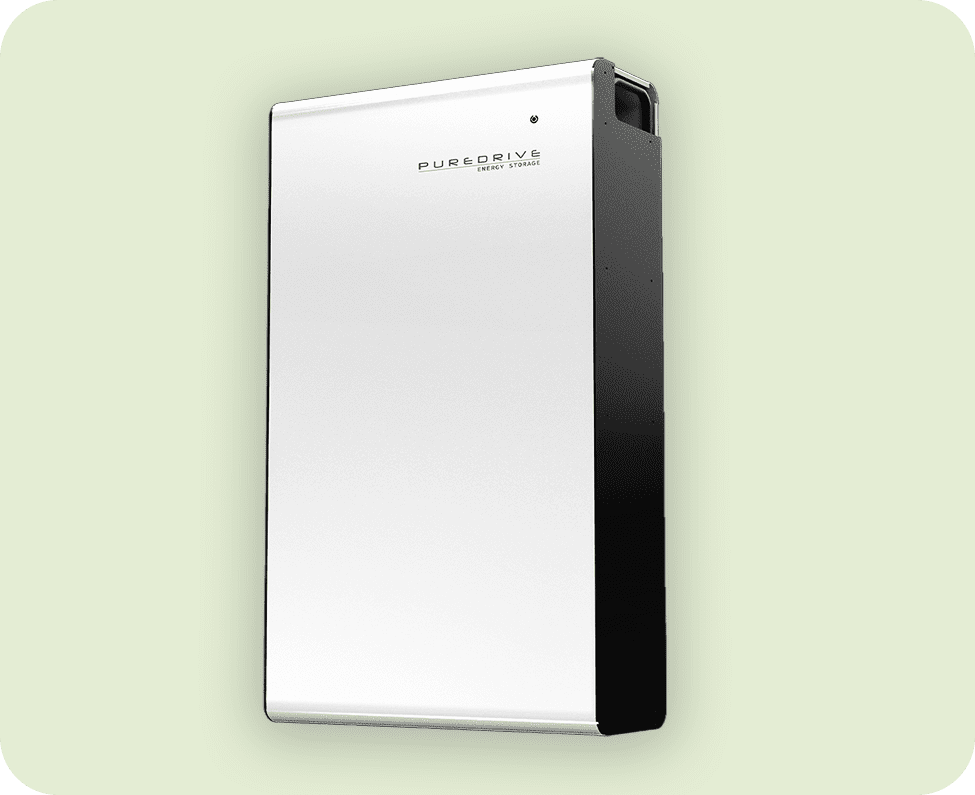
| Specification | Value |
| Dimensions | Height 737mm x Width 737mm x Depth 387mm |
| Weight | 69kg |
| Depth of discharge | 90% |
| Warranty | 10 years |
| Storage capacity | 5 kWh |
| Usable capacity | 4.5 kWh |
| Max power output | 5.0 kW |
| Installation | Standing or mounted |
Moixa Smart Battery – £4,450
The Moixa Smart battery is very similar to other solar batteries, and let’s be honest there isn’t much difference in any of them, so to entice you in they have gone all out on the warranty.
Most solar batteries come with a 10-year guarantee, and the Moixa is no different, but if you sign up for Moixa Gridshare they will extend that to a lifetime guarantee.
Yep, that battery is for life so long as Moixa are getting 50% of the cash for the electricity you export to the grid… so, you have to weigh up whether having a battery for life is better value than selling your energy to a normal supplier via SEG…. or if you want to sell it Moixa for that guarantee.
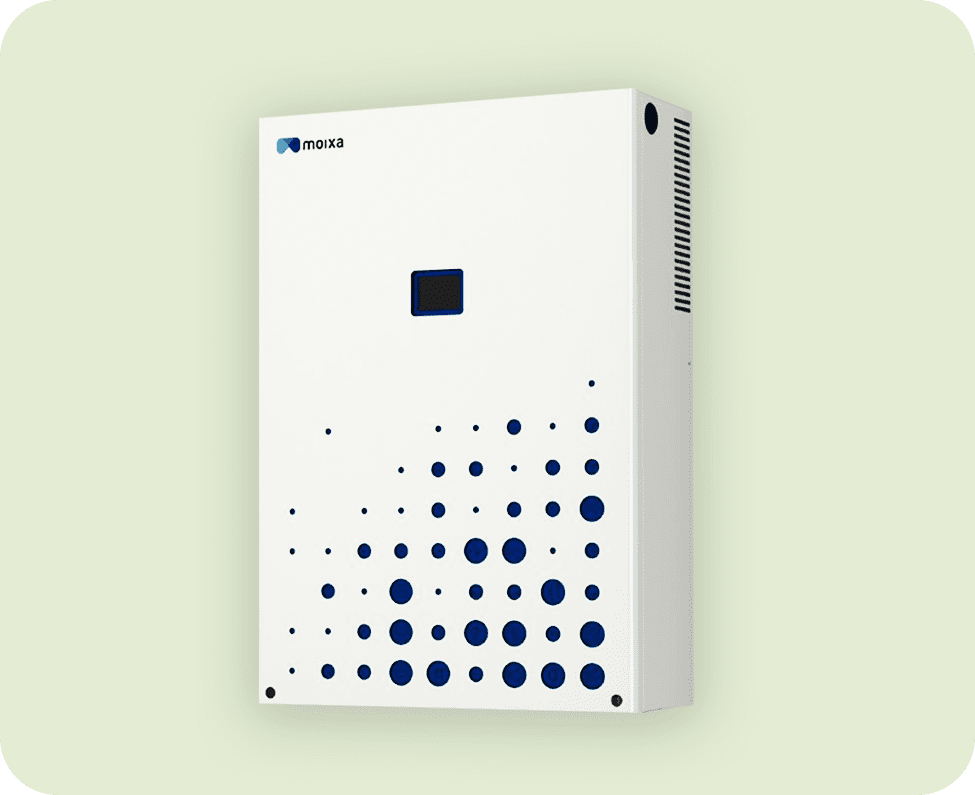
| Specification | Value |
| Dimensions | Height 345mm x Width 505mm x Depth 245mm |
| Weight | 156.9g |
| Depth of discharge | 85% |
| Warranty | 10/3 years |
| Storage capacity | 4.8 kWh |
| Usable capacity | 4.04 kWh |
| Max power output | 850 W |
| Installation | Mounted |
Greenlinx – £various
Greenlinx offer one of the most reliable batteries on the market today.
They are small, lightweight, and able to discharge 100% due to the excellent battery management storage.
They can be linked together to increase storage which, again, means you can save up for extra storage or replace one battery without having to lay out huge amounts of cash.
You can monitor each battery individually using the management system and they work well with the LuxPower Hybrid Inverter.
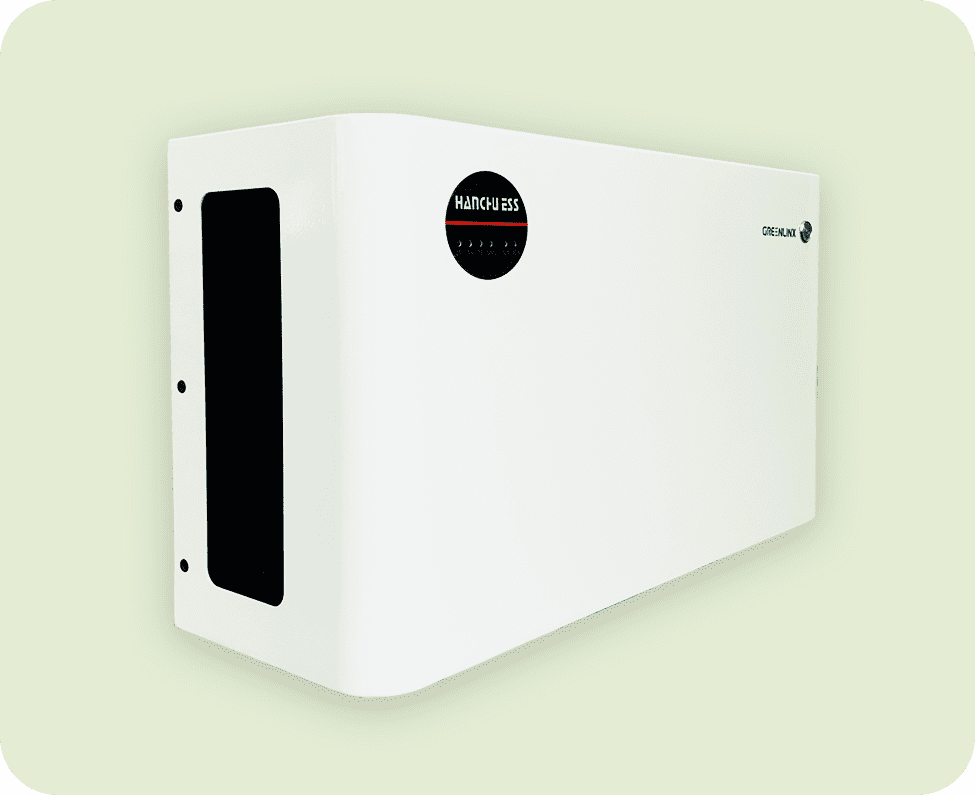
| Specification | Value |
| Dimensions | Height 484mm x Width 302mm x Depth 165mm |
| Weight | 34.9 kg |
| Depth of discharge | 100% |
| Warranty | 10 years |
| Storage capacity | 3.2 kWh |
| Usable capacity | 3.2 kWh |
| Max power output | 2.4 kWh |
| Installation | Mounted |
Huawei Luna 2000 5kWh- £2,700
The Luna 2000 is another modular system that allows you to build your storage up, or down, depending on your needs and budget.
The batteries stack on top of each other, they are 5kWh each, you can have 3 in one stack to create 15kWh of storage and linking 2 stacks together is possible.
It really is a very elegant solution and the batteries connect to a control module that communicates with the inverters and apps

| Specification | Value |
| Dimensions | Height 960mm x Width 670mm x Depth 150mm |
| Weight | 63.8 kg |
| Depth of discharge | 100% |
| Warranty | 10 years |
| Storage capacity | 5 kWh |
| Usable capacity | 5 kWh |
| Max power output | 3.5 kWh |
| Installation | Stacked |
SolaX Triple Power HV 11.6kWh – £5,270
Solax offers another modular battery solution with their Triple Power HV.
Each 5.8kWh battery can be hooked up to 3 other batteries to give a whopping capacity of 23kWh!
Solax has also made their latest models much more tolerant to temperature changes, which makes them reliable in extreme weather.
The public is very happy with these batteries as they are getting rave reviews all over the internet.
We feel the modular systems will be the future of energy storage, as it allows customers to purchase, or replace, batteries as they have the funds.
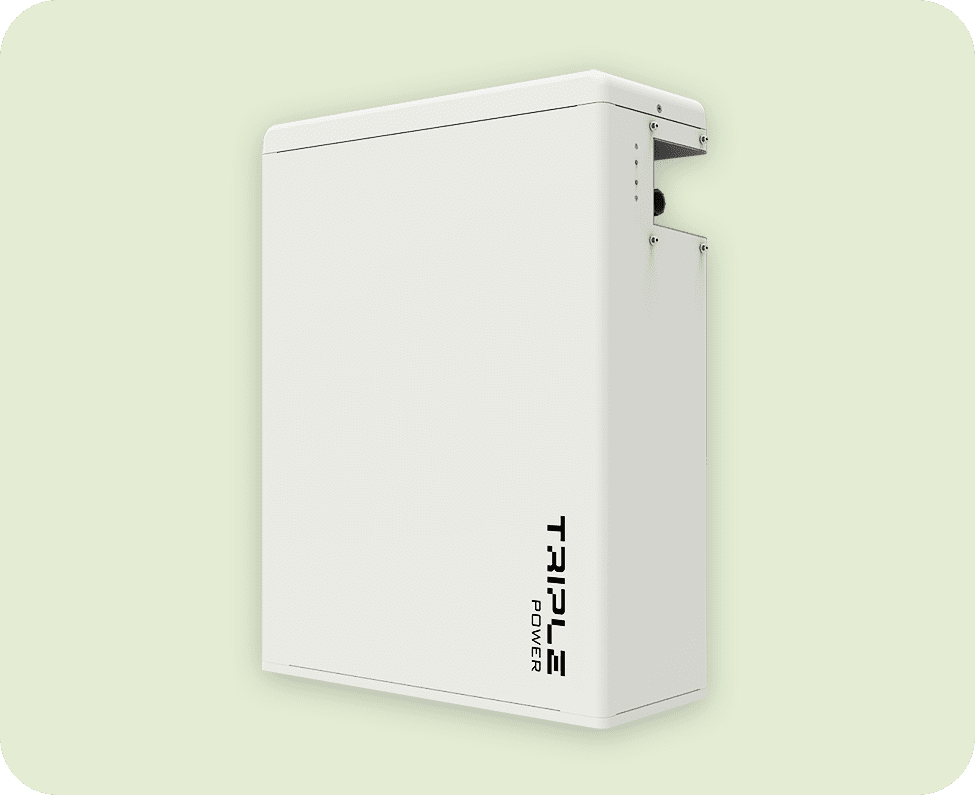
| Specification | Value |
| Dimensions | Height 708mm x Width 474mm x Depth 193mm |
| Weight | 72.2 kg |
| Depth of discharge | 99% |
| Warranty | 10 years |
| Storage capacity | 11.6 kWh |
| Usable capacity | 11.5 kWh |
| Max power output | 4 kWh |
| Installation | Stacked |
Generac PWRcell – £14,600
You probably need a minute to get over that enormous price tag – but what is it you get for your money?
This is another scalable system, going up in 3 kWh to an eyewatering 34 kWh!
That’s pretty much total self-sufficiency from the grid if you have the panels to charge the system.
The 11 kWh is the one we are looking at for a start, that’s the biggest capacity of any single battery on this list, including industry leader Tesla.
Also, the Smart Management Modules help you to manage where your electricity is going, either the home or the grid.
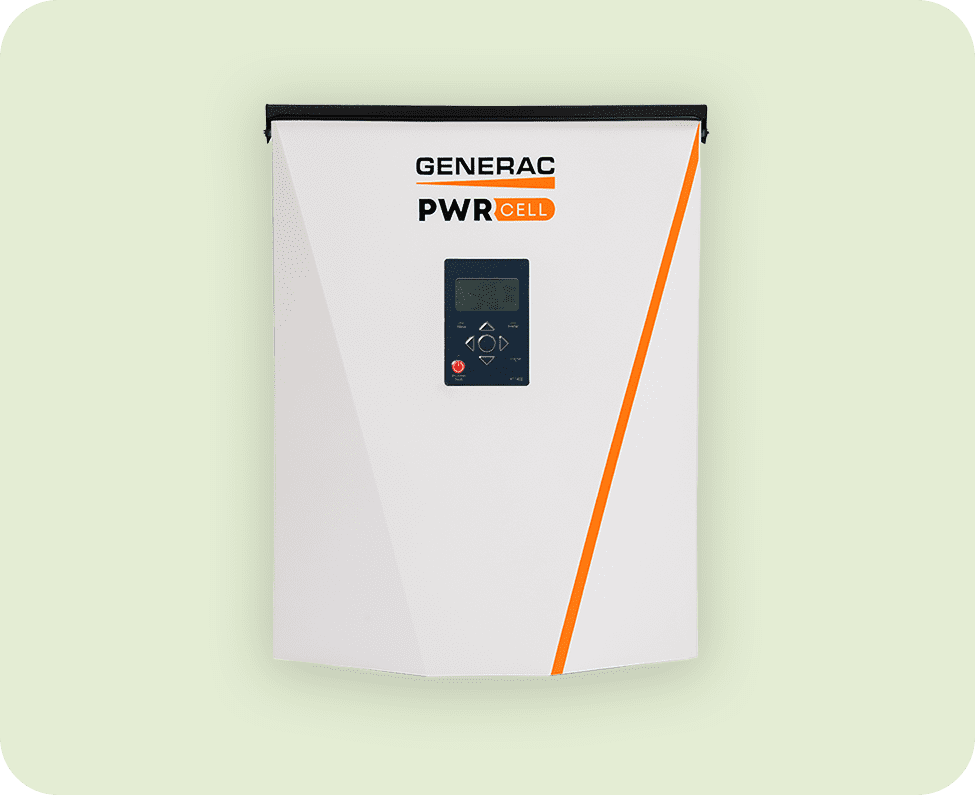
| Specification | Value |
| Dimensions | Height 1727mm x Width 559mm x Depth 254mm |
| Weight | 208 kg |
| Depth of discharge | 96% |
| Warranty | 10 years |
| Storage capacity | 9 – 34 kWh |
| Usable capacity | 17.8 kWh |
| Max power output | 11 kWh |
| Installation | Stacked – Standing |
LG Chem Resu-10H – £4,321.32
LG is a name you can trust when it comes to electronics, and their battery storage solutions are no different.
They have been working on making the installation process much more simple by simplifying connectors and ensuring this battery is super lightweight.
The firmware for battery management can be updated using an SD card plus the battery fits a huge range of inverters and features the ‘World Best Energy Density’.
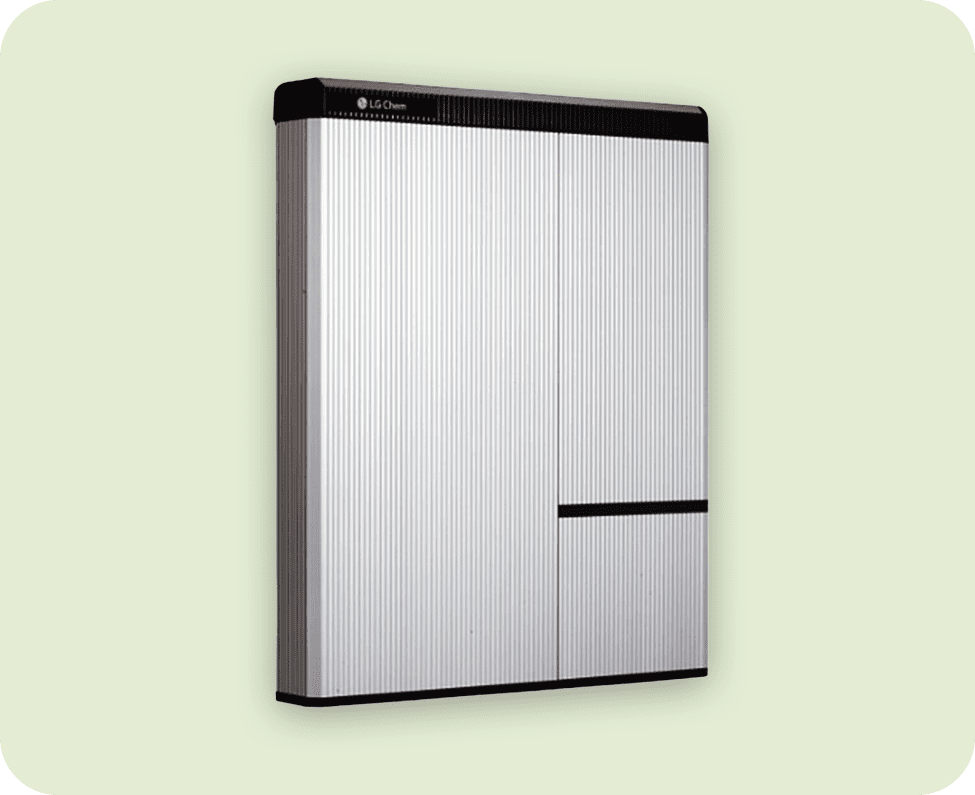
| Specification | Value |
| Dimensions | Height 744mm x Width 744 mm x Depth 206mm |
| Weight | 97 kg |
| Depth of discharge | 96% |
| Warranty | 10 years |
| Storage capacity | 9.8 kWh |
| Usable capacity | 8.8 kWh |
| Max power output | 5 kWh |
| Installation | Mounted – Standing |
Enphase AC Battery – £2500
Enphance offers entire systems including batteries, inverters and controllers, and their batteries are a fabulous solution for someone wishing to build their system as they use it.
They come in 1.2 kWh modules, which is by far the smallest amount of storage of any battery on this list.
You can start off with that kind of storage and, if you wish, add in another 13 batteries to get your system up to a cool 16.8 kWh – which is more than enough for a 5 bed, family home.
Of course, you have to have the panels to charge the battery, which is another brilliant aspect of this system as you can add batteries, and panels as you go along.
Another thing worth mentioning is the operating temperatures range from minus 20 to plus 45 degrees Celsius, so even if you live in the wilds of the Scottish Highlands, or just outside Penzance, your batteries are never going to fail you.
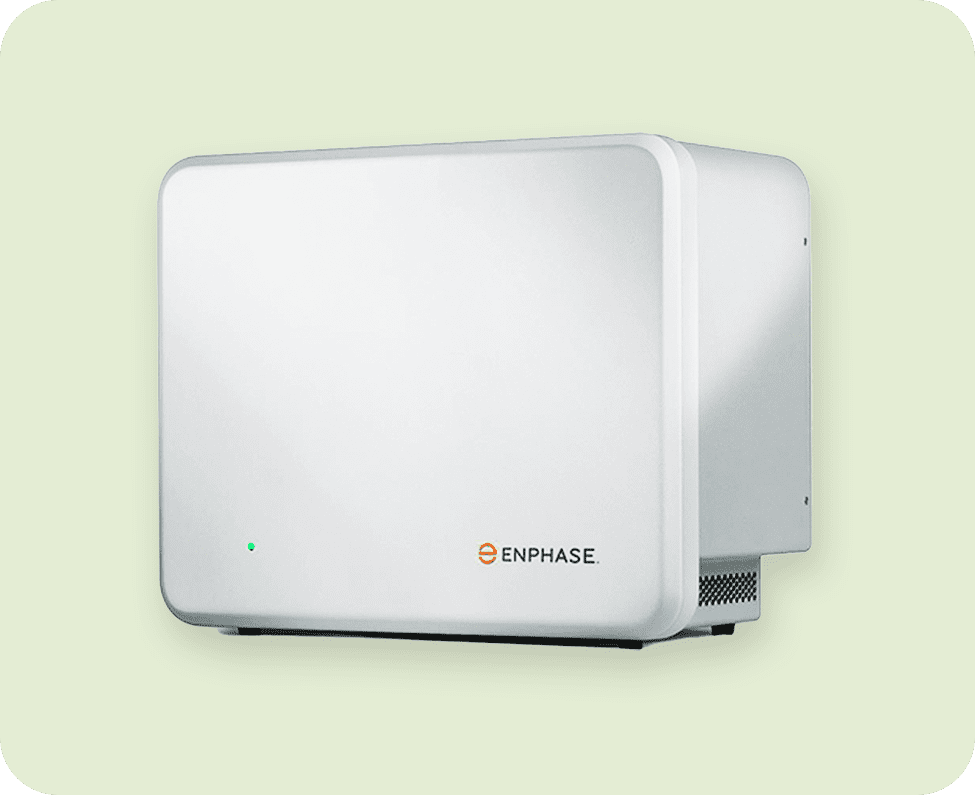
| Specification | Value |
| Dimensions | Height 325mm x Width 390 mm x Depth 220mm |
| Weight | 23 kg |
| Depth of discharge | 96% |
| Warranty | 10 years |
| Storage capacity | 1.2 kWh |
| Usable capacity | 1.15 kWh |
| Max power output | 260 kWh |
| Installation | Mounted |
Conclusion
As you can see, the variety and range of batteries is enormous, and we have only picked 10 from the 100s to choose from.
The type of battery you can use will very much depend on the system you have and how you will be using your electricity.
One thing we recommend is looking at the solar warranty, most are 10 years, but it is best to read the small print in case that decade comes with some pretty strict conditions.







